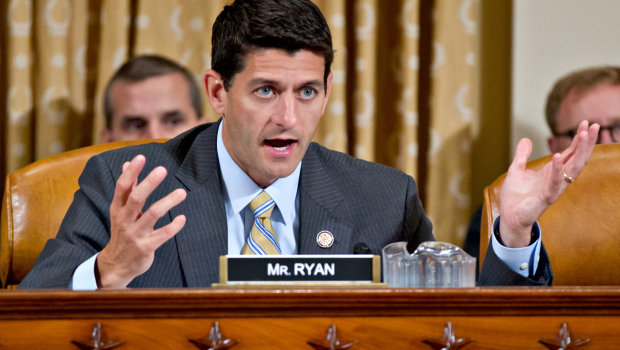Ryan plan may be a bit too bold for American public

The federal budget plan proposed about a week ago by Rep. Paul Ryan, senior Republican on the House Budget Committee, has been called “daring” and “bold.” Although they might seem new, the ideas he advances have been around for years. The plan just takes them to a more extreme level. If adopted, even in watered-down form, it would seriously affect seniors and the disabled.
Briefly summarized, Ryan’s plan, referenced as the “Path to Prosperity,” would balance the federal budget primarily by taking funds from Medicare and Medicaid. It would privatize Medicare, eventually raise the age for eligibility for Medicare to 67 and it would block grant Medicaid spending.
Under the Ryan projections, government costs on mandatory health programs would be reduced from 14 percent of Gross Domestic Product (projected) to 5 percent by 2050. Also based on the projections, unemployment would drop to 2.8 percent, a figure so low that even the wildest expectations and the Federal Reserve System would not allow it. The Heritage Foundation Center for Data Analysis later amended its unemployment figure to 4.27 percent in 2020.
Here is how the system would work with Medicare and Medicaid for seniors and the disabled.
Effect on Medicare. Americans now pay into Medicare during their working lives anticipating that, if they are disabled or when they reach age 65, they will be eligible for basic benefits under Medicare. True, there are co-pays and deductibles, which is the reason why many Medicare beneficiaries take out Medicare Supplement or Medicare Advantage private health insurance but the basic Medicare benefit is knowable.
Congress passed Medicare and Medicaid in 1965 because insurers did not want to insure the elderly and the poor and disabled or, if they did, it was at extremely high premiums. Recognizing the need for seniors and the poor and disabled to have health care, the government passed the programs.
Under the Ryan plan, the government would, instead, give seniors an allowance to buy health insurance from private insurers, the same insurers who did not want them in the first place. The amount given would be indexed to inflation, not inflation in health care but overall inflation. Under these circumstances it would be anticipated that seniors would keep close tabs on their health care spending. One danger is that many might not seek help when they need it.
As to the Affordable Care Act (Obama health care reform), Ryan would repeal the health care law’s insurance exchanges where private individuals would “shop” for coverage and repeal the individual mandate meaning that participation in Medicare as in other health insurance would be voluntary. Seniors could voluntarily decide to be uninsured as they well might since their premiums would likely skyrocket.
Based on a reported analysis, according to the Congressional Budget Office, a typical 65-year-old with private health insurance covering standard Medicare benefits could be liable for 61 percent of his or her total health care costs in 2022 under the Ryan plan and 68 percent of total health care costs in 2030.
What happens to Medicaid. State governors have been calling for years for authority to make the Medicaid system a block grant program. As far back as 1995, Newt Gringrich, Republican Speaker of the House, introduced a plan during the Clinton era. Under a block grant system, Washington would give states a specified amount of money toward services and the states would decide how to spend it. There is some of that now in that states tailor programs to their needs. However, certain groups at minimum must be covered.
Medicaid as it works now is an entitlement — meaning that, if the applicant fulfills conditions for eligibility, he or she is to receive the benefit. If a state wants to change these conditions, it may submit a waiver application to the federal government.
There are some deep concerns if states are free to spend Medicaid funds in whatever way they wish since they might, for instance, decide to discontinue paying the costs for certain skilled nursing care or further reduce the number of admissions. They might restrict eligibility for programs for individuals with certain disabilities and politics may enter into the equation if certain areas of the state are favored for Medicaid spending as opposed to others.
While budgets are on the table there certainly is a need to arrive at new solutions for the future. This bold plan, however, might be too daring for the American public.
For more, listen to “50+ Planning Ahead” a weekly radio program on WCHE 1520 on every Wednesday from 4:30 pm to 5:00 pm with Janet Colliton, Colliton Law Assocs., PC, and Phil McFadden of Home Instead Senior Care.
About the Author Janet Colliton
Esquire, Colliton Law Associates, P.C. Janet Colliton has practiced law for over 38 years, 37 of them in Chester County, Pennsylvania, a suburb of Philadelphia. Her practice, Colliton Law Associates, PC, is limited to elder law, Medicaid, including advice, applications and appeals, and other benefits planning including Veterans benefits, life care and special needs planning, guardianships, retirement, and estate planning and administration.
